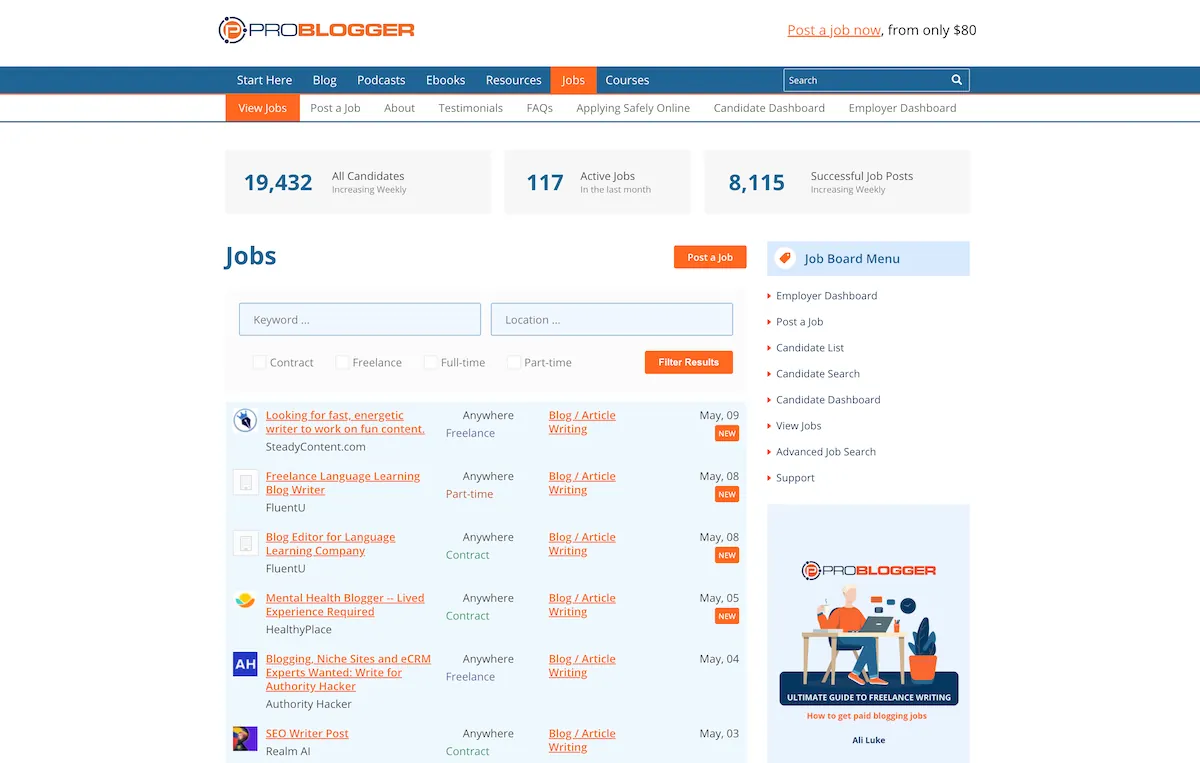Freelance writing is a popular career path for those with writing skills and a desire to make money on their own terms. But if you’re new to the industry, you might be wondering what exactly a freelance writer does.
Freelance writing involves writing content for clients, and they may be individuals, businesses, or large organizations. As a freelance writer, you do this on your own and you are not employed by anyone. This is a great way to make extra money, or it can become a full-time career.
Below, I’ll discuss how to start freelance writing, and answer the question of what do freelance writers do. I have several years of experience as a freelance writer myself. So I’ll draw upon that to hopefully help you understand if it’s the right choice for you!
What Is Freelance Writing?
Freelance writing is the practice of writing for clients, companies or organizations. You do this completely on your own, without being employed by them. This type of work has benefits for the writer and also for the clients.
Freelance Writer Job Description
A freelance writer is someone who provides writing services for other businesses or individuals in a self-employed capacity. They may work with one or more clients at one time, and they may work across a variety of industries. Some freelance writers are specialists in one field, while others write in various niches.
What Freelance Writing Involves
Freelance writers can work remotely and there’s typically no need for a formal hiring process (although some clients may take a formal approach). This can make it very cost-effective, especially for small businesses.
Freelance writers can often choose which topics they want to write about. They can also choose what type of format they want to adopt for their content and who they want to work for. However, getting to this point in a freelancing career takes time and dedication. In the beginning, many freelance writers take on any job that comes their way.
Marketing Your Skills
A huge part of freelance writing is knowing how to effectively market yourself and your work. Good writing is key of course, but you also need to know how to sell yourself. Good selling is about helping the client and adding value to their business. So, you need to show potential clients how they can benefit from your freelance writing services.
Note: There are lots of great books out there that help with this aspect of the role. You can find a list in our guide to the best freelance writing books.
There are other important aspects of being a freelance writer. I’ll go through the steps to become one a little later, but now let’s take a closer look at what the job involves.
What Does A Freelance Writer Do?
A freelance writer writes whatever their client needs, in return for payment. They may write for big enterprise clients or small businesses (or even individuals). Writing is typically the bulk of the job, but some editing will usually be required as well.
But there’s also the business side where you need to seek out new clients and opportunities and pitch your ideas to them. This is the part that involves a bit of extra time and effort on top of the actual writing.
Finding clients can be tough, and keeping them relies on you providing high-quality services that add value to their business. As I mentioned above, you need to be able to market yourself well. I’ll talk more about where you can find freelance writing jobs later on.
A freelance writer’s job includes:
- Writing content (ranging from blog posts to ebooks, and everything in between)
- Editing their own content
- Adding images or other relevant media to content
- Finding and communicating with clients
- Marketing their services
- Constantly learning and improving
Is Freelance Writing Hard?
Freelance writing involves a lot of hard work and dedication (it’s a myth that freelance writing is an easy way to make money). If you’re not used to working for yourself and sticking to your own schedules, it can be quite difficult. It’s also hard for some beginners to find clients. The key is to market yourself well, create a strong portfolio, and produce quality work.
Want to learn more about the career choice? Check out our guide to the risks of freelance writing.
Next, I’ll run through some of the most common freelance writing formats.
Examples Of Freelance Writing Formats
Blog Posts
Many beginner freelance writers search for opportunities to write blog posts for clients. There are countless blogs out there that hire for this kind of content. These can cover every niche imaginable, from pets and lifestyle to cooking and gardening. If you get your niche down early, you can find some great success writing blog posts.
Blog posts and articles don’t typically pay the highest rates in the industry, but a lot of this comes down to the client.
Website Copy
If you’re looking to write for websites, there are many ways you can contribute besides just writing blog posts. You can write product descriptions for small businesses for example. Many businesses also hire freelance writers to create their general website copy. From about pages to information about the services they offer, business writing is a good market to get into as a freelance writer.
Like blog posts, this kind of copy doesn’t tend to pay the highest rates, but it depends again on the client. If the content is heavily sales focused, the rates can increase substantially.
Sales Copy
This is copy with the intention making a customer take action. This could involve buying a product or subscribing to a newsletter for example. But, like I mentioned above, it could be product descriptions or even just information about the business. If it’s written well by someone that knows copywriting, this can be an effective way for a business to boost sales.
These freelance writing jobs tend to pay quite well, as the content itself is designed to drive revenue. You’ll need solid copywriting skills though. So we recommend checking out our guide to the best copywriting books for freelancers to boost your knowledge of the industry.
White Papers
You could also write white papers. These are in-depth reports or guides on specific topics that present problems and provide solutions. User manuals for products are also common, along with HR documentation, press releases, and much more.
These usually require a fair bit of expertise combined with good writing skills. So, they might not be best for a beginner freelance writer that doesn’t yet know what they’re good at. But they can definitely pay well, and they’re often longer-term projects too.
Social Media
Social media posts are another common format for freelance writers. This could involve writing and curating social media posts for a business for example. Or it could be scripts for livestreams, videos, and podcasts.
The earning potential here varies a lot. Big influencers might have bigger budgets for this kind of thing, while small businesses that just want to boost their online presence might pay relatively low rates.
Ghostwriting
You’ll probably come across a lot of ghostwriting jobs as a beginner freelance writer. This involves writing content published under someone else’s name, or under no name at all. Ghostwriting is a good way to get writing experience – and of course some money. However, you can’t claim the work, so it’s not useful if you’re trying to build a writing portfolio.
Ghostwriting may take the form of long-term projects (like books and ebooks), or it might be individual items (like ghostwritten blog posts).
I’ve alluded to the earning potential of these job types, but just how much can a freelance writer get paid?
How Much Do Freelance Writers Get Paid?
Of course it varies a lot in terms of how much a freelance writer gets paid, but you don’t want that answer! So, below is a table with the average earnings you might be able to expect as a freelance writer in different niches.
Note that obviously the specific earning potential will depend on a couple of important things, including:
- The client’s budget
- Your experience level
- What unique value you can add to the project
- The word count/length of the project
Freelance Writer Salary By Niche
| Niche | Potential Annual Salary |
| Technical Writing | $65,000+ |
| Financial, Legal and Medical Writing | $44,000 – $97,000 |
| Copywriting | $58,000 |
| Digital Marketing | $60,000 |
| Ghostwriting | $71,000+ |
You can learn more about these numbers and what affects them in our article on the highest paid freelance writing niches.
How To Start Freelance Writing (5 Steps)
1. Consider Whether It’s Right For You
The first thing you need to do – as with every career choice – is to consider whether freelance writing is the correct choice for you. Not everyone that’s good at writing should be a freelance writer (and there are downsides to this career path). Below are some questions to ask yourself before you jump into it:
- Do you enjoy writing? (Obviously!)
- What do you enjoy writing about?
- Do you like the idea of working for yourself?
- Would you be able to cope with setting your own schedule?
- Can you afford to go without regular income?
- Are you prepared to market your services?
- Are you able to handle difficult clients? (Granted you might not know the answer to this one yet)
Think about your answers to these questions – they’re important ones to ask yourself before going down this career path. There’s a high chance you won’t have regular income for a period of time when you first get started.
You need to be able to deal with that mentally, but also from a practical perspective, you must be able to afford to live through this phase.
If you think it could be the right choice for you, the next thing to consider is what niche (or niches) you’d like to write about.
2. Choose Your Niche
The best way to choose your niche is by evaluating your skills and your interests and trying to figure out where they intersect. However, you don’t need to stick to just one niche. You might have lots of interests, but narrowing it down to a few is the best way to find success as a freelance writer.
Let’s say you have a journalistic background and a passion for rock music. You could focus on writing news articles for music websites, blogs or magazines.
Or maybe you’re a scientist and you’ve mastered the basics of good research, but you’re also very curious about technology. You could try writing blog posts for websites dedicated to informing readers about the latest news in the world of tech. Combining niches is a great way to get the most out of freelance writing.
Looking for ideas? Here are some popular freelance writing niches:
- Personal finance (due to the high-value nature of this niche, you’ll likely need some solid expertise)
- Gardening (a vast niche in its own right)
- Cooking (everything from recipes to the history of cooking)
- Pets (you can narrow things down to specific pets)
- Sport (from skiing to golf)
Do You Need To Pick A Niche?
It’s worth noting that you don’t really need to narrow things down to one niche to be a successful freelance writer. Many people (like me) get their start in freelance writing by taking on all kinds of jobs that aren’t necessarily related to one particular industry.
While non-specialized jobs don’t necessarily pay as highly as those that require expertise, they can serve as a great opportunity to get your foot in the door of the freelance writing world.
Skip ahead to the next section if you want to know where you can find these kinds of freelance writing jobs.
3. Build Your Writing Portfolio
Now that you’ve decided on your niche (or even if you haven’t decided on one), you need to start building your portfolio. This is a collection of your writing that you can show off to potential clients, sort of like a CV or resume.
Now for a bit of potentially controversial advice: As a beginner freelance writer, this might involve offering to work for free.
Writing some articles for free gives you a few portfolio pieces to help get the wheels turning. While you shouldn’t make writing for free a habit, it can be a useful way to break into the world of freelance writing. However, the best way really is to get some paying clients.
The better your portfolio is, the higher you can start aiming and the more you can start earning. Websites like Contently allow you to create intuitive portfolios that easily showcase your best pieces and past clients you’ve worked with.

Having a blog can also double as a portfolio. So, if you’re struggling to get work as a beginner freelance writer, you might want to create work for yourself. This allows you to write targeted posts about the industries you’d like to write for as a freelancer. You can then link potential clients to the blog to show off your work, and let it act as your own writing portfolio.
4. Finding Freelance Writing Clients
The next step is finding some clients. You can find freelance writing clients in many different places. There are lots of general-purpose freelancing sites, like Upwork, Freelancer and MediaBistro. But you can also try your luck on freelance writing job boards, like BloggingPro, ProBlogger, or FreelanceWriting.com. These usually provide more profitable, enjoyable and long-term gigs than sites like Fiverr and Upwork.

5. Become A Better Writer
Finally, you need to know how to write effectively. This means you need to learn to optimize your tone and vocabulary to suit your client’s needs. For sales copy for example, you need to know how to command attention and write compelling calls-to-action.
For technical writing, it’s all about being concise and informative. Regardless of what kind of writing you’re doing, you need to have impeccable grammar and spelling. Proofreading your own writing at least once is a must if you want to keep your clients happy!
Now you know how to get started as a freelance writer, let’s have a quick look at some of the best places to find freelance writing jobs.
Where To Find Freelance Writing Jobs
Freelance Marketplaces
Freelance marketplaces can be good places to start finding freelance writing jobs. They don’t always pay that highly, but they often have lower barriers to entry than some other methods. Some of the most popular ones include:
Job Boards
Other great places to look for beginners (and those with some experience as well) are freelance job boards. Many of these are designed specifically for freelance writers, making them an excellent source of potential jobs. Check out some of the most popular ones below:
Other Ways To Find Jobs
Looking on dedicated freelance marketplaces and job boards is typically the best way for beginners to find some work. However, there are other ways to find your first clients, with perhaps the most obvious being cold emailing.
Reaching out to brands and businesses you’d like to write for is possibly the most direct method of finding freelance writing roles. However, it’s a very time-intensive one, and it typically comes with a high rejection rate. If you go this route, get used to hearing the word ‘no’ a lot!
You could also browse platforms like LinkedIn, which can be a useful source of jobs in all kinds of industries. You can connect with people and businesses in your niche, and there’s also the chance that someone might reach out to you to offer you work as well. However, you’ll need to build up a credible profile and portfolio for that to happen, and so it’s not the best choice for absolute beginners.
Is Freelance Writing Right For You?
If you’re looking for a way out of the regular 9-5 lifestyle, freelance writing might be for you. It offers many benefits, but it also requires a lot of hard work, dedication and discipline. No formal experience in writing is required, but being a good writer is a must!
If you’re interested in taking the next steps on the journey, check out our freelance writer checklist for more information and tips.
Raquel is a freelance writer with a knack for technology and a passion for science. She draws on her own years of freelance writing experience to craft articles for Freelance Ready on topics including freelancing on Fiverr and the popular blogging platform Medium.com. Learn more about Raquel here.
Freelance Ready is reader-supported. That means some links on this website are affiliate links. If you sign up or make a purchase through these links, we may earn a commission.


